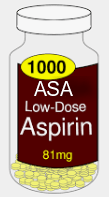 Aspirin is often promoted as the medical panacea for many ailments and as a preventive measure against heart desease, strokes, Alzheimer’s and dementia. McMaster University research debunks the myths and comments on the truth.
Aspirin is often promoted as the medical panacea for many ailments and as a preventive measure against heart desease, strokes, Alzheimer’s and dementia. McMaster University research debunks the myths and comments on the truth.
Globally, over 55 million lives were lost in 2019 due to a variety of causes. More than 30 million of those deaths, however, can be attributed to just 10 diseases or conditions. Amongst this list are the usual suspects, heart disease, stroke, Alzheimer’s and other dementias, and specific types of cancer (1). Given the staggering contribution to morbidity and mortality, it comes as no surprise that researchers, health professionals, and the general public are actively studying, prescribing, and seeking different strategies to keep these diseases and conditions at bay.
Is it true that aspirin is able to prevent some major threats to our health and well-being, threats such as heart disease, stroke, Alzheimer’s and other dementias, and specific types of cancer? Read more about the research and the myth-busting results below [ Click the colored links for more information ] :
The use of aspirin to prevent cardiovascular events—such as heart attacks—in healthy adults is a controversial yet commonly prescribed approach. Research shows that in adults without a history of heart disease, aspirin use may slightly reduce the risk of heart attack, compared to taking a placebo or nothing at all. However, it does not appear to reduce the risk of stroke, death from any cause, or death from heart disease-related complications. Evidence also suggests that aspirin use can increase the risk of experiencing major bleeding, including bleeding in the skull and brain. These results do NOT apply to people with a history of heart disease or stroke.
The exploration of the relationship between inflammation and dementia has placed a spotlight on anti-inflammatory medications such as aspirin. Research shows that in healthy older adults—described as those with no history of dementia, heart disease, or physical disability—the use of low-dose aspirin (100 mg per day) does not decrease the risk of developing dementia, compared to taking a placebo. It does, however, increase the risk of major bleeding and death. This lack of benefit weighed against health risks is one reason that we are unlikely to see further studies examining the effects of low-dose aspirin on dementia prevention (4).
When it comes to cancer prevention, use of aspirin for this purpose is highly debated. Research shows that in people with no previous history of cancer, long-term aspirin use does not reduce total cancer incidence or total cancer deaths, compared to no aspirin use. Long-term use is accompanied by an increased risk of major bleeding and total bleeding events.
The final word
Just like with any health-related decision, it’s important to consider the whole picture. Here, this means having a good understanding of our own risk for various cardiovascular issues, dementia, and cancer, as well as weighing the potential benefits against the lack of effect and risk for serious harms through a comprehensive conversation with a health care provider.
The Bottom Line
- In 2019, over half of the 55 million global deaths that occurred were due to 10 diseases or conditions, four of which being heart disease, stroke, Alzheimer’s and other dementias, and specific types of cancer.
- There are claims that aspirin can be used to help prevent the occurrence or development of heart attack, stroke, dementia, and cancer.
- In adults without a history of heart disease, aspirin may slightly reduce the risk of heart attack; but may not reduce the risk of stroke, death from any cause, or death from heart disease-related complications.
- In healthy older adults (no history of dementia, heart disease, or physical disability), low-dose aspirin does not decrease the risk of developing dementia.
- In people with no previous history of cancer, long-term aspirin use does not reduce total cancer incidence or total cancer deaths.
- Aspirin use was consistently associated with an increased risk of major bleeding.
- Discuss these findings with your health care provider to determine whether aspirin is the right preventative strategy for you and your situation. Weigh any potential benefits against the noted lack of effects and risk for serious harms.
Source: McMaster University Optimal Aging Portal





